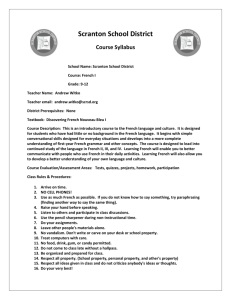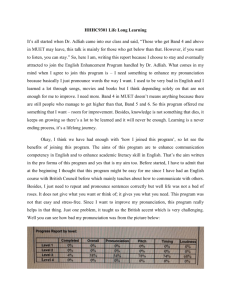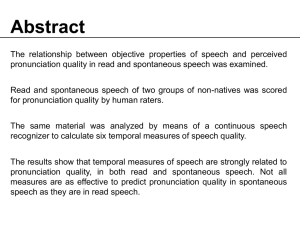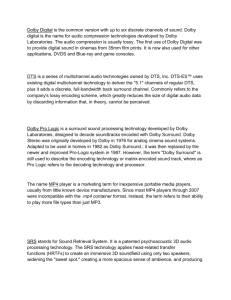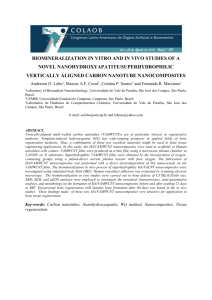tips for learning english
advertisement
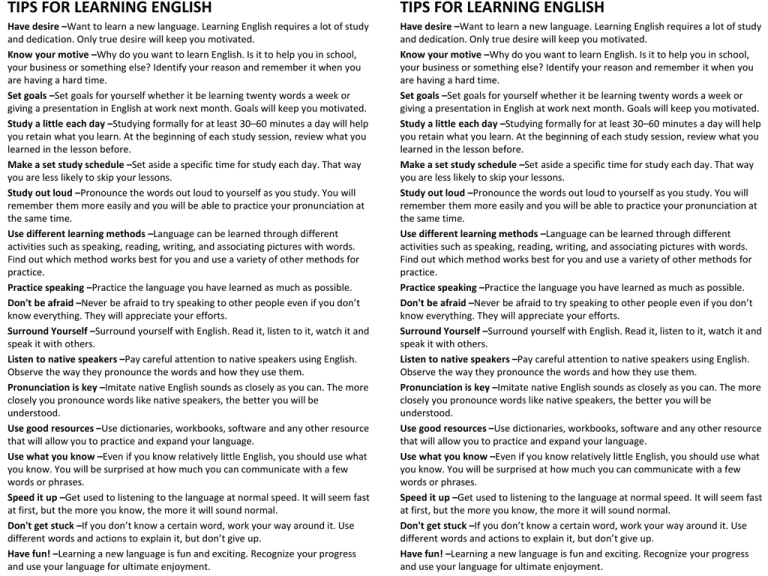
TIPS FOR LEARNING ENGLISH TIPS FOR LEARNING ENGLISH Have desire –Want to learn a new language. Learning English requires a lot of study and dedication. Only true desire will keep you motivated. Know your motive –Why do you want to learn English. Is it to help you in school, your business or something else? Identify your reason and remember it when you are having a hard time. Set goals –Set goals for yourself whether it be learning twenty words a week or giving a presentation in English at work next month. Goals will keep you motivated. Study a little each day –Studying formally for at least 30–60 minutes a day will help you retain what you learn. At the beginning of each study session, review what you learned in the lesson before. Make a set study schedule –Set aside a specific time for study each day. That way you are less likely to skip your lessons. Study out loud –Pronounce the words out loud to yourself as you study. You will remember them more easily and you will be able to practice your pronunciation at the same time. Use different learning methods –Language can be learned through different activities such as speaking, reading, writing, and associating pictures with words. Find out which method works best for you and use a variety of other methods for practice. Practice speaking –Practice the language you have learned as much as possible. Don't be afraid –Never be afraid to try speaking to other people even if you don’t know everything. They will appreciate your efforts. Surround Yourself –Surround yourself with English. Read it, listen to it, watch it and speak it with others. Listen to native speakers –Pay careful attention to native speakers using English. Observe the way they pronounce the words and how they use them. Pronunciation is key –Imitate native English sounds as closely as you can. The more closely you pronounce words like native speakers, the better you will be understood. Use good resources –Use dictionaries, workbooks, software and any other resource that will allow you to practice and expand your language. Use what you know –Even if you know relatively little English, you should use what you know. You will be surprised at how much you can communicate with a few words or phrases. Speed it up –Get used to listening to the language at normal speed. It will seem fast at first, but the more you know, the more it will sound normal. Don't get stuck –If you don’t know a certain word, work your way around it. Use different words and actions to explain it, but don’t give up. Have fun! –Learning a new language is fun and exciting. Recognize your progress and use your language for ultimate enjoyment. Have desire –Want to learn a new language. Learning English requires a lot of study and dedication. Only true desire will keep you motivated. Know your motive –Why do you want to learn English. Is it to help you in school, your business or something else? Identify your reason and remember it when you are having a hard time. Set goals –Set goals for yourself whether it be learning twenty words a week or giving a presentation in English at work next month. Goals will keep you motivated. Study a little each day –Studying formally for at least 30–60 minutes a day will help you retain what you learn. At the beginning of each study session, review what you learned in the lesson before. Make a set study schedule –Set aside a specific time for study each day. That way you are less likely to skip your lessons. Study out loud –Pronounce the words out loud to yourself as you study. You will remember them more easily and you will be able to practice your pronunciation at the same time. Use different learning methods –Language can be learned through different activities such as speaking, reading, writing, and associating pictures with words. Find out which method works best for you and use a variety of other methods for practice. Practice speaking –Practice the language you have learned as much as possible. Don't be afraid –Never be afraid to try speaking to other people even if you don’t know everything. They will appreciate your efforts. Surround Yourself –Surround yourself with English. Read it, listen to it, watch it and speak it with others. Listen to native speakers –Pay careful attention to native speakers using English. Observe the way they pronounce the words and how they use them. Pronunciation is key –Imitate native English sounds as closely as you can. The more closely you pronounce words like native speakers, the better you will be understood. Use good resources –Use dictionaries, workbooks, software and any other resource that will allow you to practice and expand your language. Use what you know –Even if you know relatively little English, you should use what you know. You will be surprised at how much you can communicate with a few words or phrases. Speed it up –Get used to listening to the language at normal speed. It will seem fast at first, but the more you know, the more it will sound normal. Don't get stuck –If you don’t know a certain word, work your way around it. Use different words and actions to explain it, but don’t give up. Have fun! –Learning a new language is fun and exciting. Recognize your progress and use your language for ultimate enjoyment. BEING BILINGUAL IS BEAUTIFUL BEING BILINGUAL IS BEAUTIFUL I came to volunteer at Nha Trang University in 2011, in the Faculty of Foreign Languages and I was immediately impressed by the commitment and passion from all of the faculty members. Headed by the Dean, Dr. Nguyen Thi Thuy Hong the faculty of foreign languages at NTU consistently and continually takes measures to improve the curriculum. I came to volunteer at Nha Trang University in 2011, in the Faculty of Foreign Languages and I was immediately impressed by the commitment and passion from all of the faculty members. Headed by the Dean, Dr. Nguyen Thi Thuy Hong the faculty of foreign languages at NTU consistently and continually takes measures to improve the curriculum. Because of the solid relationships formed with industry professionals the curriculum meets the needs of future employers. It is delivered in a way that is engaging for the undergraduates and covers learning situations such as, field trips, lab work, group activities and role plays . The “English Club”, held once a month, provides a fun way to learn and interact in English. Because of the solid relationships formed with industry professionals the curriculum meets the needs of future employers. It is delivered in a way that is engaging for the undergraduates and covers learning situations such as, field trips, lab work, group activities and role plays . The “English Club”, held once a month, provides a fun way to learn and interact in English. Regular exchanges with Vietnam’s leading Universities take place which provide students from both campuses to engage a healthy exchange of ideas. Associations with numerous international Universities means that that students have the opportunity to lean from English Native speakers. Regular exchanges with Vietnam’s leading Universities take place which provide students from both campuses to engage a healthy exchange of ideas. Associations with numerous international Universities means that that students have the opportunity to lean from English Native speakers. Workshops presented by experts from all corners of the globe are held on a regular basis ensuring that the faculty members are on a continual self development journey and that the syllabi are on a par with international educational standards. Workshops presented by experts from all corners of the globe are held on a regular basis ensuring that the faculty members are on a continual self development journey and that the syllabi are on a par with international educational standards. Nha Trang University's Faculty of Foreign Languages provides a learning environment where the student’s future is the priority. Nha Trang University's Faculty of Foreign Languages provides a learning environment where the student’s future is the priority. Bronnie Driscoll, Australian Volunteer, 2011 - 2013 Bronnie Driscoll, Australian Volunteer, 2011 - 2013
